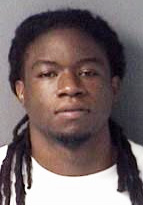Escambia Man Arrested In Juvenile Sexual Predator Investigation
March 29, 2014
After a week-long investigation, an Escambia County man has been charged with juvenile sex crimes.
James Michael Olshefskie, 43, was arrested by the Escambia County Sheriff’s Office on charges of traveling to meet a juvenile for sex, lewd and lascivious behavior and using a computer to solicit a child.
Last weekend, an Escambia County Computer Crimes investigator began communicating online with an individual who was soliciting a juvenile on the internet for sex, according to an ECSO press release. During these communications the subject solicited the investigator and suggested they meet for sex. He also allegedly sent the investigator photos which were pornographic in nature. .
Friday morning, Olshefskie attempted to meet the investigator, who he believed to be the juvenile female, at which time he was taken into custody.
Escambia Murder Suspect Arrested In Tampa
March 29, 2014
 An Escambia County man was arrested in Tampa Friday for a December 2012 murder in Escambia County. Corey Antwone Hill, 29, is in the Hillsborough County Jail awaiting extradition to Escambia County for the murder of Alfred L. Watson.
An Escambia County man was arrested in Tampa Friday for a December 2012 murder in Escambia County. Corey Antwone Hill, 29, is in the Hillsborough County Jail awaiting extradition to Escambia County for the murder of Alfred L. Watson.
Watson’s body was found in a wooded area near Wentworth Street and West Maxwell Street. Forensic evidence and interviews led to the development of Hill as a suspect by Escambia County Sheriff’s Office investigators.
Hill was arrested with the assistance of the U.S. Marshals.
Weekend Gardening: Choosing Heirloom Or Hybrid Tomatoes
March 29, 2014
by the Florida Extension Service
Tomatoes are a favorite of backyard gardeners. Fresh-grown tomatoes are packed with flavor and nutrition. Due to their popularity, many different types of tomatoes have been developed and selected over time. Choosing the best type for your individual growing situation will increase your chance of enjoying a mouth-watering tomato sandwich on a hot summer day.
Heirloom vegetables are back in vogue. A tomato must meet three criteria to be considered an heirloom variety. The variety must grow “true to type” from seed saved from each fruit, the seed must have been available for more than 50 years and the variety must have a history or folklore of its own. Heirloom vegetables are also called open-pollinated or non-hybrid.
Heirloom tomatoes are known for their full flavor and excellent taste. Gardeners who start their plants from seeds have always had many choices available to them. This year, I was surprised to see some heirloom seedlings in stores including ‘Cherokee Purple.’ This is an heirloom from Tennessee rumored to have come from Cherokee gardeners. Its rich flavor is said to be similar to the much-celebrated Brandywine.
While heirlooms offer better flavor, they do have a downside. Their biggest weakness is that they are not generally disease resistant and therefore more susceptible to devastating and sometimes fatal diseases. Heirloom varieties also experience more fruit defects such as cracking and catfacing.
 To overcome the potential disease pitfall of heirloom varieties, many gardeners are now grafting their tomato seedlings. In the case of heirloom tomatoes, grafting involves connecting the shoot of the heirloom variety to the roots of a disease-resistant rootstock. The cut pieces are held together by a grafting clip until the tissues grow together (pictured left).
To overcome the potential disease pitfall of heirloom varieties, many gardeners are now grafting their tomato seedlings. In the case of heirloom tomatoes, grafting involves connecting the shoot of the heirloom variety to the roots of a disease-resistant rootstock. The cut pieces are held together by a grafting clip until the tissues grow together (pictured left).
To learn more about heirloom tomatoes and grafting, read the UF/IFAS publication entitled, “Growing Heirloom Tomato Varieties in Southwest Florida.” It’s available online at http://edis.ifas.ufl.edu/hs174 or by calling your local Extension Office.
Hybrid tomatoes are those that have been breed and selected for their disease resistance and productivity. They are the first-generation cross between two “pure” parental lines.
The simplest way to define an F-1 hybrid is to take an example. Let’s say a plant breeder observes a particularly good growth-habit in a plant, but with poor flower color, and in another plant of the same type they see good color but poor habit. The best plant of each type is taken and self-pollinated (in isolation) each year and, each year, the seed is re-sown. Eventually, every time the seed is sown the same identical plants will appear. This is known as a ‘pure line.’
If the breeder then takes the pure line of each of the two plants they originally selected and cross pollinates the two by hand the result is known as an F-1 hybrid. Plants are grown from seed produced and the result of this cross pollination should have a good habit and good color.
 The vigor of hybridization can increase yields, improve pest resistance and impart other desirable characteristics. Some have credited crop hybridization as a prime reason for our country’s ability to feed larger populations with fewer farmers.
The vigor of hybridization can increase yields, improve pest resistance and impart other desirable characteristics. Some have credited crop hybridization as a prime reason for our country’s ability to feed larger populations with fewer farmers.
A down side of hybridization is that if you collect and save the seed from a hybrid variety, its offspring will show a loss of that hybrid vigor – it will start to revert back to its inbred parents. If you want the vigorous capacity that comes with hybrid varieties; don’t save the seed for replanting. You will have to buy new seed each year.
To learn about tomato varieties recommended for Florida gardens, read the UF/IFAS publication entitled “Tomatoes in the Florida Garden.” It’s available online at http://edis.ifas.ufl.edu/vh028 or by calling your local Extension Office.
Florida Gov’t Weekly Roundup: Session Near MidPoint
March 29, 2014
Tallahassee was coated in yellow as the session neared its midpoint this week.
Some legislators may have wished that the film of pollen blanketing the city was pixie dust as the reality begins to set in that “bills will die.”
 Capitol denizens were handed at least a temporary distraction from the sneezing and sniffling, overshadowed by giddiness spawned by soccer superstar — and all-purpose hunk — David Beckham. Numerous lawmakers, along with Gov. Rick Scott, flooded Twitter with “selfies” shot with the entrepreneur, who made the rounds in search of funding for a pro-soccer stadium project Beckham is planning in Miami.
Capitol denizens were handed at least a temporary distraction from the sneezing and sniffling, overshadowed by giddiness spawned by soccer superstar — and all-purpose hunk — David Beckham. Numerous lawmakers, along with Gov. Rick Scott, flooded Twitter with “selfies” shot with the entrepreneur, who made the rounds in search of funding for a pro-soccer stadium project Beckham is planning in Miami.
Red-light runners got watery-eyed for a different reason. Sponsors in both chambers put the brakes on a red-light camera repeal this year, admitting they don’t have the votes to turn off the mechanical watchdogs.
As the azaleas burst into bloom, budget writers in the House and Senate put the finishing touches on their respective versions of the state’s roughly $75 billion spending plan for the upcoming year. The proposals are separated by different approaches to four-year college degrees and spending on water projects.
And with nothing related to spring but perhaps a lot to do with the fall election season, Gov. Rick Scott’s elections chief announced he is dropping a controversial process to scrub the voter rolls of non-U.S. citizens. Secretary of State Ken Detzner blamed the federal government for his reversal, but critics say Scott’s administration backed off because the process risked alienating Hispanic voters considered crucial for a re-election win in November.
DUELING BUDGETS HEADED FOR FLOOR VOTES
The House and Senate budget committees finalized their preliminary spending plans with few — but noticeable — differences.
The Senate Appropriations Committee on Thursday approved a $74.9 billion budget, one day after its House counterpart signed off on a $75.3 billion spending plan.
The Senate blueprint includes more funding for higher education and water projects in South Florida, while the House earmarks more for public education and state springs preservation. The House plan (PCB APC 14-09) would plow hundreds of millions of dollars more into education-construction projects. Lawmakers have plenty of time to iron out differences between the two spending plans during conference meetings over the next few weeks.
The Senate budget writers spent the bulk of their meeting Thursday debating a portion of the proposal that could potentially pit state colleges against state universities. The Senate plan (SB 2500) would cut $3.5 million cut from state colleges’ four-year degree programs and steer those funds toward state universities.
Scaling back four-year degree programs at state colleges, which were at one time community colleges that offered two-year degrees, has been an ongoing dispute between colleges and universities. Critics accuse the State Board of Education, which oversees the colleges, of too readily granting four-year degree programs.
At Thursday’s meeting, several senators complained that the colleges are creating too much competition for the universities, overseen separately by the Board of Governors. The four-year degrees at state colleges are supposed to cater to local workforce needs, the critics said.
Senate Appropriations Chairman Joe Negron, R-Stuart, said there were now 175 four-year programs offered at state colleges, which have veered away from their core mission of two-year degrees and prepping students for university study. Negron said he wants Florida universities to be in the same “elite level” as the University of Virginia, the University of North-Carolina-Chapel Hill and the University of Michigan.
“And we can’t do that if we’re running two systems that are overlapping,” he said.
Negron also pointed out that the proposed cut is just a fraction of the nearly $1.2 billion in funding for state colleges, which would still see an overall increase when other spending is factored in.
But Sen. Jack Latvala, a Clearwater Republican who is in a battle against Negron for a future Senate presidency, slammed the proposal. He said it would lead to lawmakers protecting their pet colleges and could run counter to the Legislature and Scott’s drive to lower tuition costs.
“When our governor made a bold request to try to find institutions that would give a $10,000 college degree, I didn’t see any universities step forward and say that (they would do it),” Latvala said. “It was our state colleges that stepped forward to do that.”
RED-LIGHT CAMERA BLUES
Red-light cameras won’t be turned off in Florida this year. House and Senate sponsors of measures that would repeal the traffic monitors this week put the brakes on what has become a perennial fight in the Legislature.
Senate Transportation Chairman Jeff Brandes, R-St. Petersburg, backed away from a repeal effort (SB 144) after it became clear he did not have the votes to pass it in his own committee. Instead, he proposed changes to increase regulations on red-light cameras, but the bill remained stuck in his committee.
On Wednesday, the panel shot down attempts by Brandes to amend the bill. The committee rejected an amendment that would have allowed motorists to employ a “rolling stop” at speeds up to 15 mph when taking right-on-red turns if no pedestrians were in the crosswalk. The Florida Police Chiefs Association and Florida Sheriffs Association opposed that plan. And the committee also red-lighted an amendment that would have required warnings instead of tickets to be issued to owners of vehicles caught on camera going through traffic signals 0.5 seconds after the colors changed from yellow to red.
“Clearly if I don’t have the votes to adopt simple amendments that are common sense, such as standardizing turns throughout the state of Florida, clearly you would see that the broader issue was not long for this world,” said Brandes, a harsh critic of the cameras first authorized by the Legislature four years ago and now in use by 77 county and city governments across the state.
Brandes and Rep. Frank Artiles, a Miami Republican who is sponsoring a House companion, contend that the cameras are cash cows for local governments and are an invasion of privacy.
To keep his proposal on track earlier in the week, Artiles backed down from his original plan to ban new cameras from being installed.
The revised measure (HB 7005) would allow new cameras at intersections but only if their use is justified through traffic engineering studies.
Artiles’s original proposal would also have reduced fines from $158 to $83, eliminating the money local governments could collect from the red-light runners.
In early February, Artiles and Brandes held a press conference in the Capitol to highlight a report from the Office of Program Policy Analysis & Government Accountability, the Legislature’s non-partisan policy office. The report found there were fewer fatalities but more crashes at electronically monitored intersections and that fines issued due to the technology cost motorists nearly $119 million last year.
But groups such as the Florida League of Cities have opposed legislative attempts to dramatically change red-light camera programs. Those groups contend the cameras are a public safety tool.
“It’s about revenue, it’s not about safety,” Artiles told the House Transportation & Economic Development Appropriations Subcommittee on Monday. “What good is it for cities and counties and the state to collect this revenue and not implement it for safety purposes?”
VOTER SCRUB SCRUBBED, REDUX
Detzner went on the road in October to pitch a controversial cleansing of the voter rolls. The state had won its battle with the U.S. Department of Homeland Security and gained access to a database Detzner and his lawyers insisted is crucial to guaranteeing that people registered to vote in Florida are U.S. citizens. Use of the database would give the state the opportunity to revamp a previously flawed process that misidentified thousands of eligible voters in 2012, Detzner said at the time.
Less than six months later, Detzner took many by surprise with Thursday’s announcement that he is scrapping the scrub. Despite its seemingly benign “Project Integrity” label, critics of the process insisted it was designed to target minority voters, especially Hispanics.
Detzner blamed the feds for his turnaround, saying that the database was undergoing changes that won’t be complete until 2015. As a result, Detzner told elections supervisors he decided “to postpone implementing Project Integrity” until the modifications are complete, which would be long after the November election — with Scott on the ballot — is over.
Supervisors abandoned the 2012 effort, which was the brainchild of Scott, after discovering that the lists of voters flagged by Detzner’s office as potential non-citizens were riddled with errors.
Of the 2,600 targeted voters, 85 were found to be ineligible to vote and dropped from the rolls. After the U.S. Department of Justice sued Scott over the purge, Scott took the Obama administration to court to get access to the database. A deal between the state and the Department of Homeland Security was struck last year.
Critics of the purge accused Scott of trying to prevent minorities in Florida — a critical swing state — from voting in the 2012 presidential election because many of the voters on the list had Hispanic-sounding last names. Hispanics are considered a crucial voting bloc in the upcoming governor’s race.
The voter purge turnaround comes as Scott, whose 2010 platform included support of an Arizona-style immigration law, is embroiled in controversy related to former campaign finance chairman Mike Fernandez’s resignation from the team. Fernandez complained, in part, about campaign officials ignoring his advice about how to deal with Hispanics.
In a series of internal e-mails leaked to The Miami Herald and Politico, Fernandez, a billionaire who raised more than $30 million for the governor’s re-election effort, criticized the campaign for being insensitive to Hispanics. The Herald reported that Fernandez complained about two campaign aides making jokes in a Hispanic accent while en route to a Mexican restaurant.
Scott’s campaign manager Melissa Sellers said that Fernandez was not in the van when the reported comments were made.
“If something was said in an accent, no one remembers what it was. We are a diverse organization and we do not tolerate inappropriate comments,” Sellers said in an e-mail.
While civil- and voting-rights organizations applauded Detzner’s announcement, Florida Democratic Party Chairwoman Allison Tant accused Scott’s team of an attempt at “damage control” by abandoning the purge.
“Now, embroiled in a scandal involving racist jokes targeting Hispanics, the governor suddenly has made (an) about-face and suspends the latest attempt to kick voters off of the voting rolls — attempts that have overwhelmingly targeted Hispanics in the past. It is now clear to all that the original reasons given for the voter purge (were) mere pretexts to intimidate voters Rick Scott would frankly rather not vote,” Tant said in a statement.
STORY OF THE WEEK: Florida drops controversial election-year voter purge.
QUOTE OF THE WEEK: “In November, I will vote for every Florida politician that doesn’t have a selfie with David Beckham. Both of them.” — Documentary film director Billy Corben.
by Dara Kim, The News Service of Florida
Scott Says FHP Bonuses Won’t Be Tied To Tickets Written
March 29, 2014
Gov. Rick Scott on Friday rejected the possibility that bonuses for Florida Highway Patrol troopers could be connected to the numbers of traffic tickets they write.
 Scott issued a strongly worded statement after media reports raised questions about whether the Department of Highway Safety and Motor Vehicles was considering such a plan.
Scott issued a strongly worded statement after media reports raised questions about whether the Department of Highway Safety and Motor Vehicles was considering such a plan.
“The idea that FHP would tie officer bonuses to the number of tickets they write is absolutely outrageous and wrong,” Scott said in a prepared statement. “All state worker bonuses should be based on better — not worse — outcomes for the people of Florida who pay the taxes to fund state government.”
The Tallahassee Democrat reported Sunday that the Florida Police Benevolent Association was concerned that the department, which oversees the Highway Patrol, would link trooper evaluations with “public contacts,” which include traffic stops, traffic citations, written warnings and arrests.
In contract offers with the union, the department said traffic-citation quotas would not be put in place, the Democrat reported. But Scott appeared Friday to try to end any speculation on the issue.
“Floridians paying more in tickets is not a better outcome. Period,” he said. “If this idea comes across my desk, I will reject it.”
Vera Lloyd Jackson
March 29, 2014
Vera Lloyd Jackson, age 71 of Jay, went to be with the Lord on Friday, March 28, 2014. Vera was born March 10, 1943, in Century to Mildred and Adone Lloyd Sr. She has been a lifelong resident of Jay where she was a member of Cora Baptist Church. Vera was a business owner and operator at Jay hardware and Gift Shop for 35 years. She was a Jay Royals supporter in all sports, a sponsor too many little league teams and was a true Gator fan through the good times and bad.
She was preceded in death by her husband of more than 40 years, Aubrey Bryant Jackson; son, Eric Bryant Jackson, and her father, Adone Lloyd Senior.
She is survived by a son, Alan Brent (Angie) Jackson. She was deeply loved by her four grandchildren, Ali, Sissy, Brandy and Alan; her great-grandson, Jace; her mother, Mildred Powell; brother, Adone (Nancy) Lloyd; special nieces, Shannon Wright and Wendy (Scott) Blackmon; great-nephews, Jared Smith, AJ Nash, and Slater Nash and great-nieces, Olivia Wright and Zoe Wright who were also special to her; two sisters-in-law, Joyce Settle, and Eleanor Jackson; numerous cousins, relatives, and friends who will all miss her dearly.
A visitation will be held from 1 p.m. until 3 p.m. at Jay Funeral Home on Sunday, March 30, 2014. Funeral services will begin at 3 p.m. with Rev. Earle Greene and Rev. LaDon Hall officiating services.
Burial will follow at Cora Baptist Church Cemetery.
Pallbearers will be Scott Blackmon, Ricky Hendricks, Sandy Burkhead, David Bush, Jeff Boutwell, Zane Burkhead, and Jim Wolfe.
Jay Funeral Home is in charge of arrangements.
Billy Faye Smith
March 29, 2014
Billy Faye Smith, 76, of Jay, went to her Heavenly home on Saturday, March 29, 2014, at Jay Hospital. Billie Faye was born in Jay on March 22, 1938 to Andrew C. and Vassie (Cayley) Cannon. She was later blessed with a brother, John H. Cannon.
She grew up in church and gave her life to the Lord at an early age. She was a member of the Joy Circle for many years; she loved singing in the choir, and was a member of Beta Sigma Phi. She enjoyed teaching Sunday school, but especially loved bible school. She loved to dress-up and decorate her rooms to match the story of the day. Many children, who are now adults, still remember her teachings. Christ was always first in her life.
Billie Faye married her school sweetheart, Max Ray Smith on August 17, 1956. Their marriage was blessed with a son, Max Allen Smith and a daughter, Kelly Smith. Together they traveled the world spreading the word of Christ. They were married 57 years. She was a “clipper” of the newspaper. Recipes were her favorite, but anything that interested her was clipped and put in a box. Oh the box of clippings we have.
She was preceded in death by her parents, Andrew (Vassie) Cannon and her brother, John H. Cannon.
Survivors include her husband, Max Ray Smith; son, Max Allen (Andrea) Smith; daughter, Kelly Renee Smith of Jay; nephew, John A. (Rhonda) Cannon and a great niece, Caren Alaine Cannon, who called her Nana, as well, of Walnut Hill; three grandchildren, Julie Anna (Ben) Adkinson, Holly Elizabeth (Trent) Ledbetter, and Janna Renee (Bryan) Ellis; six great-grandchildren, Annasyn Maleah and Olivia Faith Adkinson, Bella Elizabeth, Blane Trent, and Boone Cannon Ledbetter, and Hydie Raye Ellis, all of Jay.
A visitation will be held on Monday, March 31, 2014, from 6 p.m. until 8 p.m. at Jay Funeral Home.
Funeral services will be held on Tuesday, April 1, 2014, at 11 a.m. at Jay Funeral Home.
Burial will follow at Jay City Cemetery.
Jay Funeral Home is in charge of arrangements.
Rain Forces Tate, Northview Softball And Baseball Cancellations
March 28, 2014
Tonight’s Tate Lady Aggies “Strike Out Cancer” game versus Navarre High School has been rescheduled for Monday at 6:30 p.m. due to weather.
Northview vs. Jay softball has been canceled for today. The games have been rescheduled for Monday, JV at 4:00 and varsity at 6:00. Northview vs. Chipley will be play varsity only on Friday, April 4 at 4:00.
Northview vs. Jay baseball has been canceled for today, both JV and varsity. The varsity has been rescheduled for Saturday at 2:00 at Jay.
Tate’s ninth grade baseball game for today has been canceled and has not yet been rescheduled.
Weather Causes Scattered Power Outages, Downs Trees
March 28, 2014
Scattered power outages were reported Frodau morning by both Gulf Power Company and Escambia River Electric Cooperative. Most of the outages were small, impacting just a few customers each. Pictured above: A tree down across power lines and Molino Road near Highway 99 that caused an estimated six Gulf Power customers to lose power. Submitted photo by Tom Dickson for NorthEscambia.com, click to enlarge.
Century Leaders Looking Toward China To Land Local Jobs
March 28, 2014
Two Century leaders are in Dothan today with their eyes on China for possible jobs.
Mayor Freddie McCall and Century Chamber Economic Development Coordinator Cindy Anderson are attending the U.S.-China Manufacturing Symposium. Co-organized by SoZo Group and China Chamber of International Commerce, the symposium brought to about 400 Chinese businessmen looking to bring businesses to American soil.
 The Dothan event is the combination to two events, including the smaller Alabama-China Partnership Symposium that was held a few years ago in Monroeville, Ala. That event paid off for Thomasville, , a town of 4,209 people just over 100 miles northwest of Century, landed a deal with the Golden Dragon copper tubing plant that now employs over 100 people with plans to triple that workforce in the next year. The town was able to recruit the Chinese plant that employees local Thomasville residents without ever traveling to China.
The Dothan event is the combination to two events, including the smaller Alabama-China Partnership Symposium that was held a few years ago in Monroeville, Ala. That event paid off for Thomasville, , a town of 4,209 people just over 100 miles northwest of Century, landed a deal with the Golden Dragon copper tubing plant that now employs over 100 people with plans to triple that workforce in the next year. The town was able to recruit the Chinese plant that employees local Thomasville residents without ever traveling to China.
Century was the only small Florida Panhandle community invited to participate.
Century’s price tag for attending the event includes $2,400 in registration fees, hotel expenses for McCall (Anderson’s lodging is being paid for by the Century Chamber), and $1,253 for ad agency Ideawörks to create and print 500 tri-fold brochures promoting Century.





